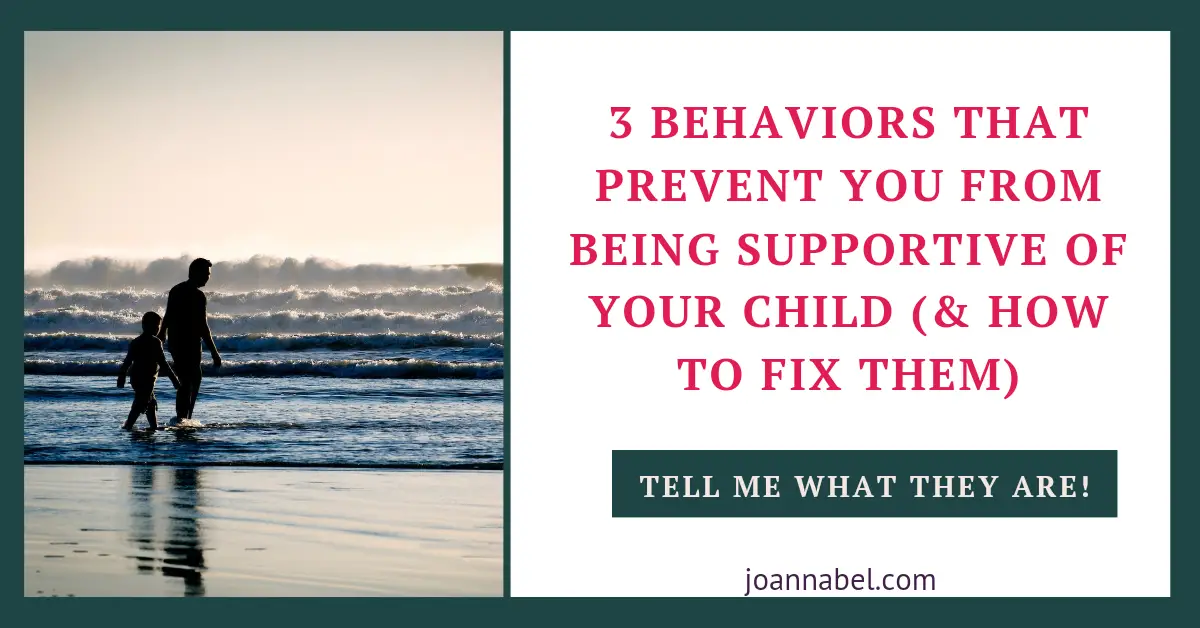If you need some inspiration to help your efforts to be gentle and show compassion for your child, I’ve prepared 100 ways to be kind to your child.

100 Ways To Be Kind To Your Child
Kindness isn’t just about few activities you can throw in here and there; it’s how you relate to and treat your child consistently, meaning how the whole relationship looks and feels to both of you.
Now, this doesn’t mean you have to be flawless or that you can’t make mistakes or fail.
Moreover, it’s even better if you make mistakes or fail, because those are opportunities for learning and change.
What matters is whether, at its core, this relationship is nurturing or not, which doesn’t mean that you won’t have your challenging moments, where, depending on circumstances, you may be capable of being more or less supportive.
Just remember that when you’re genuinely kind to yourself, you have more chances to also be kind to your child. And know that enough flexibility will take you far.
To help you show all your kindness to your child, I’ve written a list of 100 ways to be kind to your child. I’m sure you’ll find this comprehensive list useful and motivating.
Bookmark the page to come back to it whenever you need some ideas or reminders.
Let’s start with our 100 ways to be kind to your child.
This post has affiliate links which means that we make a commission from qualifying purchases at no additional cost to you. For more information read our Affiliate disclosure.
Note: Although I am a Clinical Social Worker, engaging with this website does not establish a professional social worker-client relationship. The information provided here is for general purposes only and should not be considered professional advice. While we strive to ensure accuracy and reliability, this content is not a substitute for professional guidance. For specific concerns, issues, or situations, it is essential to consult a qualified professional and present your situation. Read the full Disclaimer here.
100 WAYS TO BE KIND TO YOUR CHILD

1. Spend time playing with them.
2. Ask them what they want to do and do it with them.
3. Support them in pursuing their interests.
4. Let them negotiate for themselves.
5. Ask them how they feel and what they think.
You may be interested to read later:
6. Nurture open communication.
7. Ask open-ended questions.
8. Answer their questions, especially the pressing ones.
9. Let them make their own decisions.
10. Introduce them to personal development and its importance.
11. Stay connected at all times and in all situations that include them.
12. Let them explain themselves.
13. Let them make mistakes; even inspire them to do so, in order to teach them to experiment and be open to learning new things.
14. Praise their efforts when they’re trying to learn new things and gain new skills, including times when they’re failing.
15. Show them how to do things in life.

16. Be open with them about things that are going on around them that are affecting their lives indirectly or directly.
17. Show that you respect them instead of just declaring it.
18. Encourage their independence and responsibility.
19. Give them enough time to learn their lesson.
20. Teach them what you know.
21. Tell them how you see them and how you feel about them.
22. Really see them for who they are, not for what you want them to be.
23. Inspire and support them to be themselves.
24. Explain why they’re wrong when this is so.
25. Set realistic expectations regarding their progress, achievement, and success.
26. Communicate the expectations, rules, and boundaries you have for them.
27. Share how your day went with them.
28. Ask them what the highlight of their day was.
29. Trust their words and experiences.
30. Feel their feelings with them.

Check out also:
- 100 WAYS TO CHANGE YOURSELF AND EMPOWER YOUR EVOLUTION
- 100 WAYS TO IMPROVE YOURSELF (FROM ORDINARY TO EXTRAORDINARY)
- 100 WAYS TO IMPROVE YOUR LIFE (GO FROM GOOD TO GREAT)
- 100 WAYS TO LIVE A BETTER LIFE AND FIND YOUR BLISS
- 100 WAYS TO BE KIND TO YOUR CHILD
31. Joke with them.
32. Give them long hugs.
33. Tell them how much you appreciate them.
34. Teach and show them solidarity.
35. Nurture empathy in how you relate to them.
You may be interested to read also:
36. Teach them how to calm themselves down.
37. Always be understanding so that they can open up to you when they need this.
38. Encourage them to make decisions and solve problems on their own, promote self-reliance that way.
39. Teach them the importance of personal space and honor their need for it.
40. Understand that your child is still learning and growing, so allow them time and space to develop at their own pace.
41. Demonstrate kindness, empathy, and compassion in all your own actions to allow them to learn through observation.
42. Teach them the importance of forgiveness and explain how this can help them grow.
43. Dedicate uninterrupted time to engaging in activities they enjoy.
44. Embrace and celebrate their individuality and unique traits.
45. Support their natural curiosity by exploring new topics that interest them and fostering a love for learning.
46. Help them understand the feelings of others.
47. Encourage acts of kindness towards their peers and strangers.
48. Engage in meaningful conversations with them.
49. Encourage them to believe in their ability to learn and grow, emphasizing effort and progress over perfection.
50. Speak kindly and avoid using harsh or demeaning language – stay kind to the child but firm with your demands.
51. Teach them how to reflect on their actions and choices to foster self-awareness.
52. Let them know that it’s okay to feel a range of emotions.
53. Make sure to show up for important events.
54. Help your child understand the importance of consent in interpersonal interactions and relationships.
55. Explain the importance of personal boundaries and be a good role model concerning this.
If you found the information on the blog helpful & inspirational and you feel like giving back, you can do it by clicking the donate button after entering amount you’re comfortable with. I’ll use it to create and deliver more useful content and resources like this. Thanks for your precious contribution!
56. Engage in charitable acts with them and let them initiate them as well.
57. Utilize everyday situations as opportunities to impart valuable life lessons.
58. Establish rituals that have the potential to create lasting memories for them.
59. Take care of your physical and mental well-being to set a good example.
60. Help them learn how to set goals.

61. Teach and model responsible money spending habits.
62. Establish a calming bedtime routine that includes quality time, storytelling, and a peaceful environment for their peaceful sleep.
63. Support them in trying new things regularly so that they can get more comfortable leaving their comfort zone.
64. Allow and encourage your child to think outside the box.
65. Help them develop resilience by acknowledging the importance of perseverance.
66. Engage in physical activities with them and play games with them.
67. Nurture an active interest in their schoolwork.
68. Promote a positive body image.
69. Collaborate with them to find solutions to challenges they encounter by only staying supportive and encouraging and not taking the lead in problem-solving.
70. Inspire honoring diversity and respecting differences.
71. Create opportunities for them to connect with their cultural, religious, or community origins.
72. Explain the importance of personal values and decision-making that’s in alignment with them.
73. Help them build strength and determination to resist peer pressure.
74. Engage in community service together.
You may want to read later:

75. Support their participation in sports or physical activities that are good for their health, learning teamwork, and building discipline.
76. Teach yourself and them about Children’s Rights.
77. Always try to understand their perspective during challenging situations.
78. Help them find their own creative outlet for self-expression.
79. Help them develop critical thinking skills.
80. Remember to give them genuine compliments and praise.
81. Explain bodily autonomy to them and model it. Start with respecting theirs.
82. Expose them to different cultures, backgrounds, and perspectives to promote acceptance of different people.
83. Encourage healthy risk taking.
84. Ensure that all family members have an equal voice (have their voices hearn and accepted).
85. Reflect on your parenting practises, detect areas for improvement, and put in the effort to make the necessary adjustments to prioritize kindness and compassion.
86. Help them learn how to nurture supportive relationships.
87. Include random acts of kindness.
88. Help them learn to trust their interests.
90. Encourage them to remember to appreciate the simple joys of life.

91. Take care of your mental health and ask for help if you face mental illness to normalize this for them.
92. Dedicate regular time for family bonding activities, such as game nights, outings, or shared meals, to strengthen family connections.
93. Teach them to communicate their needs.
94. Recognize and praise their hard work, perseverance, and growth, regardless of the outcome.
95. Introduce them to age-appropriate financial concepts, skills, and decision-making.
96. Teach your child to be kind, understanding, and compassionate towards themselves.
97. Emphasize the value of rest and relaxation.
98. Educate them on digital safety.
99. Teach your child the importance of mindfulness and being present in the moment.
100. Schedule dates with them and stick to the schedule.
Recommended Resources For You:
Latest Posts:
- How To Help Cultivate Your Child’s Interests in Art

- The Bedroom Door: Why Privacy for Teens Isn’t Optional

- The Importance of Play in Child Development

- 5 Hobbies That Will Help You Connect With Your Teens

- A Guide to Balancing Parenting Roles After Divorce

- Gifts for Your Teenager That They’ll Actually Enjoy

FINAL THOUGHTS ON 100 WAYS TO BE KIND TO YOUR CHILD
Parenting is a remarkable journey that allows you to shape and nurture the lives of your childr(en).
By embracing these 100 ways to be kind to your kids, you can create a loving and supportive environment that fosters their growth, development, and well-being.
Remember, kindness is not a one-time act but a continuous practice that requires patience, empathy, and understanding.
As a parent, you have the power to instill values, build character, and help cultivate a more positive mindset in your children.
Every act of kindness, whether big or small, has the potential to leave a lasting impact on their lives and enables you to create a foundation for their emotional, social, and cognitive development.
If kindness becomes the cornerstone of child-rearing, fostering a generation of compassionate and empathetic individuals who will make a positive difference in the world can become a standard.
I hope you found this helpful and I’ll see you in my next post! Before you go, read my post:









Leave a Reply